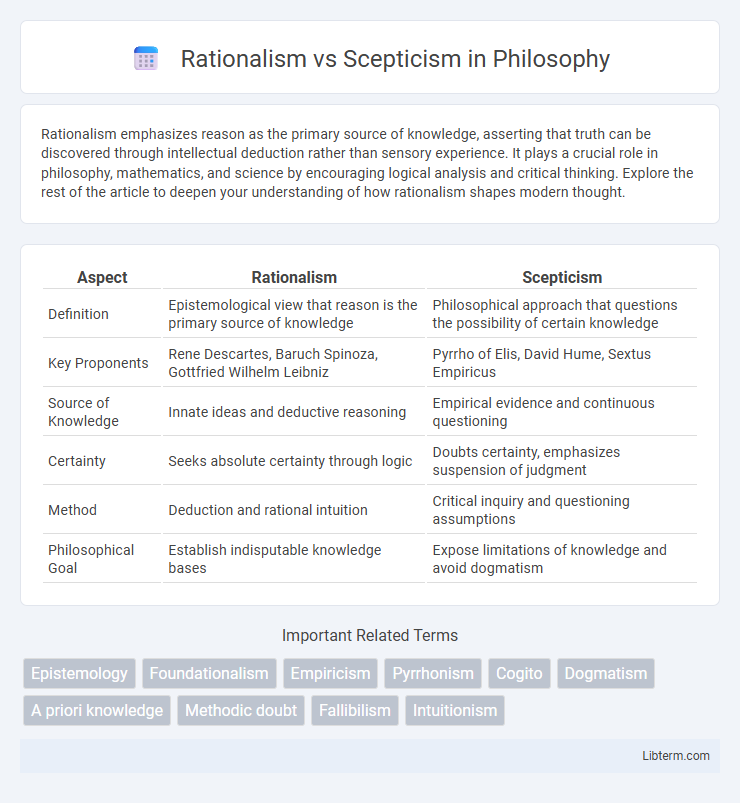Rationalism emphasizes reason as the primary source of knowledge, asserting that truth can be discovered through intellectual deduction rather than sensory experience. It plays a crucial role in philosophy, mathematics, and science by encouraging logical analysis and critical thinking. Explore the rest of the article to deepen your understanding of how rationalism shapes modern thought.
Table of Comparison
| Aspect | Rationalism | Scepticism |
|---|---|---|
| Definition | Epistemological view that reason is the primary source of knowledge | Philosophical approach that questions the possibility of certain knowledge |
| Key Proponents | Rene Descartes, Baruch Spinoza, Gottfried Wilhelm Leibniz | Pyrrho of Elis, David Hume, Sextus Empiricus |
| Source of Knowledge | Innate ideas and deductive reasoning | Empirical evidence and continuous questioning |
| Certainty | Seeks absolute certainty through logic | Doubts certainty, emphasizes suspension of judgment |
| Method | Deduction and rational intuition | Critical inquiry and questioning assumptions |
| Philosophical Goal | Establish indisputable knowledge bases | Expose limitations of knowledge and avoid dogmatism |
Introduction to Rationalism and Scepticism
Rationalism emphasizes reason as the primary source of knowledge, asserting that certain truths can be deduced through logical thinking independent of sensory experience. Scepticism challenges the certainty of knowledge by questioning the validity and reliability of beliefs, often demanding rigorous evidence before acceptance. These philosophical approaches represent contrasting methods in epistemology, with rationalism prioritizing innate ideas and scepticism focusing on doubt and inquiry.
Historical Origins and Key Philosophers
Rationalism, emerging in the 17th century with key philosophers like Rene Descartes, emphasizes reason as the primary source of knowledge, advocating innate ideas and deductive reasoning. Scepticism, tracing back to ancient Pyrrhonian philosophers such as Sextus Empiricus, challenges the certainty of knowledge by questioning sensory experience and the reliability of beliefs. The historical origins of rationalism in the Enlightenment contrast with scepticism's roots in classical antiquity, framing an ongoing epistemological debate between certainty through reason and doubt through inquiry.
Core Principles of Rationalism
Rationalism centers on the belief that reason and innate ideas provide the foundation for knowledge, asserting that certain truths are accessible through intellectual deduction rather than sensory experience. Key principles include the emphasis on a priori knowledge, the reliability of logical reasoning, and the existence of innate concepts or ideas independent of empirical evidence. This contrasts with scepticism, which doubts the possibility of certain knowledge and challenges the certainty of reason-based claims.
Core Principles of Scepticism
Scepticism emphasizes doubting knowledge claims and insists that beliefs must be supported by clear, empirical evidence or logical justification. Core principles include questioning the reliability of sensory experience and the limitations of human reason, often suspending judgment on uncertain matters. This philosophical stance contrasts with rationalism's trust in innate ideas and deductive reasoning as sources of knowledge.
Rationalism: Strengths and Weaknesses
Rationalism emphasizes the role of reason and innate knowledge in acquiring truth, making it a powerful framework for developing logical consistency and objective understanding in fields like mathematics and philosophy. Strengths of rationalism include its ability to provide certainty through deductive reasoning and its foundation for scientific methodologies. However, weaknesses arise from its potential disregard for empirical evidence and sensory experience, which can lead to conclusions that are disconnected from practical reality.
Scepticism: Strengths and Weaknesses
Skepticism strengths lie in its rigorous questioning of knowledge claims, fostering critical thinking and preventing gullibility by demanding evidence and logical consistency. Its weaknesses include the potential for excessive doubt, which can lead to intellectual paralysis and difficulties in accepting well-founded truths or making decisions. This cautious approach balances open inquiry with challenges in establishing certainty or actionable beliefs.
Rationalism vs Scepticism in Modern Philosophy
Rationalism in modern philosophy emphasizes the use of reason and innate knowledge as the primary sources of certainty, exemplified by thinkers like Descartes, Spinoza, and Leibniz. Skepticism challenges the possibility of certain knowledge, advocating for continuous questioning and doubt, influencing empiricism and later analytic philosophy. The dynamic interplay between rationalism and skepticism shaped critical epistemological debates on the limits of human knowledge and the validation of beliefs during the Enlightenment and beyond.
Real-world Applications and Implications
Rationalism underpins advancements in technology and science by emphasizing logical reasoning and innate knowledge for problem-solving and innovation. Scepticism drives critical thinking and scientific inquiry by encouraging continuous questioning and empirical validation to avoid biases and misinterpretations. Both philosophies influence decision-making in fields such as law, medicine, and artificial intelligence, balancing certainty with evidence-based doubt for optimal outcomes.
Debates and Criticisms
Rationalism emphasizes reason as the primary source of knowledge, sparking debates with scepticism, which questions the possibility of certain knowledge. Critics of rationalism argue it often overlooks empirical evidence and sensory experience, leading to potential dogmatism. Conversely, scepticism faces criticism for fostering excessive doubt that can hinder knowledge acquisition and practical decision-making.
Conclusion: Bridging Rationalism and Scepticism
Bridging rationalism and scepticism involves recognizing the strengths of reason while valuing critical inquiry and doubt. Rationalism provides a foundation for knowledge through logical deduction, whereas scepticism ensures rigorous examination and challenges assumptions. Integrating both philosophies fosters a balanced approach to epistemology, promoting robust and well-justified belief systems.
Rationalism Infographic

 libterm.com
libterm.com